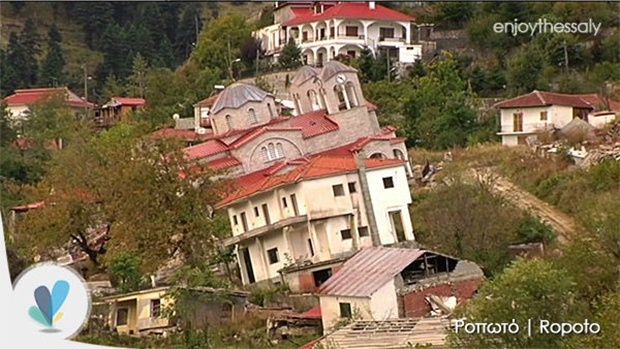Welcome to Ropoto, the Abandoned Greek Village Literally Going Downhill
The deserted Greek village of Ropoto, in northwestern Thessaly, is slowly but steadily slipping out of existence. Located 15 miles from Trikala city, the hilltop settlement was once home to a charming and bustling community, but everything changed in 2012, when a landslide caused several homes and buildings in the village square to slide down the hillsides. As many as 300 families were displaced from their homes, turning Ropoto into the ghost town it is today.
Ropoto’s tragic story is narrated in detail by former village council president Yorgos Roubies, in a 12-minute documentary produced by GreekReporter.com. Roubies lead the film crew through the sinking village, pointing out to ruins – including a crumbling hotel and school, the site where a tavern used to stand, and the wreckage that used to be his home. Recalling the terrifying day that altered the fate of the villagers forever, he said: “The first major disaster occurred early on April 12, 2012. Every autumn we were pushing the waters out of the village, to the big stream, but in 2011 there were no machines to push the rainwater away. We also had groundwater and that’s how it happened.”

“The churches, everything was gone, there’s not even a cafe here. If someone gets sick, they won’t even be able to find a glass of water. We had never seen such a disaster.”
He also explained that although the landslide is fairly recent, the signs were present as far back as the 1960s. That’s when the first cracks began to appear in the mountain, and residents were asked to leave the village center. But local politicians disagreed with scientists, choosing to ignore the problem altogether. “Geologists started giving permits to build, after ’82 everybody was getting building permits, they even issued a permit for a hotel in the center, which you see how it is today,” he said.

And now that everyone’s worst fears have come true, Roubies alleges that no one has come forward to assess the damage or offer relief to the people who were forced to leave their homes. In fact, former inhabitants claim that some of them are still expected to pay property taxes. “I’m so tired of talking about my village,” Roubies said. “It’s tiring because it’s been two years since the landslides and no one has shown any interest.”
“What’s going to happen to the people? Before it happened, people here were farmers, we were famous for our apples, all this area used to be full of apple trees, now there is nothing. The village no longer exists. No one can live there. There is no lighting, and the roads are dangerous. Nothing was done to push away the water. If we had tried to push away the rainwater and groundwater away, and the village still sank, no one would be complaining. We would say, ‘thank God no one got killed.’ No one did anything to save us.”

“I’ll keep saying it until I die, our main complaint has always been that the state did not support us. The state did not stand by the people who had nothing to eat. There are people without electricity, we have such examples near the village, they are staying in the barns, with their animals. The village has been deserted. Our dreams have… we are disappointed.”
Sadly, Ropoto’s problems are far from over; the village continues to sink at an alarming rate. “Since the last landslide, the terrain has sank 10 to 15 centimeters,” Roubies said, visibly frustrated. “It’s still sinking.”



